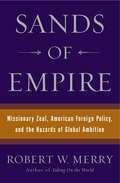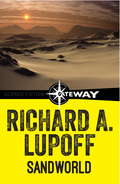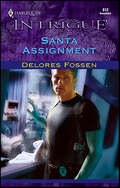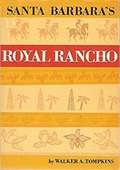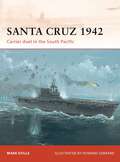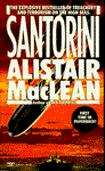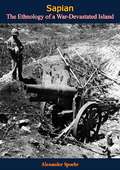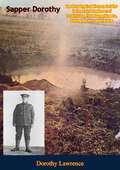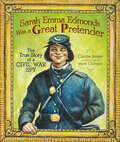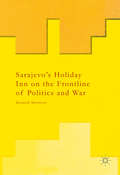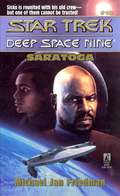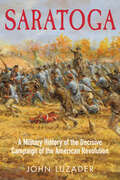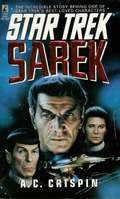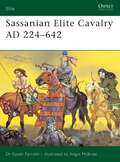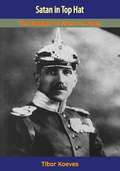- Table View
- List View
Sands of Empire: Missionary Zeal, American Foreign Policy, and the Hazards of Global Ambition
by Robert W. MerryVeteran political journalist and award-winning author Robert W. Merry examines the misguided concepts that have fueled American foreign policy since the end of the Cold War. The emergence in the George W. Bush administration of America as Crusader State, bent on remaking the world in its preferred image, is dangerous and self-defeating, he points out. Moreover, these grand-scale flights of interventionism, regime change, and the use of pre-emptive armed force are without precedent in American history. Merry offers a spirited description of a powerful political core whose ideas have replaced conservative reservations about utopian visions -- these neocons who "embrace a brave new world in which American exceptionalism holds sway," imagining that others around the globe can be made to abandon their cultures in favor of our ideals. He traces the strains of Wilsonism that have now merged into an adventurous and hazardous foreign policy, particularly as described by William Kristol, Francis Fukuyama, Max Boot, and Paul Wolfowitz, among others. He examines the challenge of Samuel Huntington's supposition that the clash of civilizations defines present and future world conflict. And he rejects the notion of The New York Times's Thomas L. Friedman that America is not only the world's role model for globally integrated free-market capitalism, but that it has a responsibility to foster, support, and sustain globalization worldwide. From the first president Bush to Clinton to the second Bush presidency, the United States has compromised its global leadership, endangered its security, and failed to meet the standard of justified intervention, Merry suggests. The country must reset its global strategies to protect its interests and the West's, to maintain stability in strategic areas, and to fight radical threats, with arms if necessary. For anything less than these necessities, American blood should remain in American veins.
Sandstorm: The first adventure thriller in the Sigma series (SIGMA FORCE #Bk. 1)
by James Rollins'Rollins is what you might end up with if you tossed Michael Crichton and Dan Brown into a particle accelerator together' New York TimesAn inexplicable explosion rocks the antiquities collection of a London museum - and sets off alarms in clandestine organisations around the world...Lady Kara Kensington's family paid a high price in money and blood to found the gallery that now lies in ruins. And her search for answers is about to lead her into a world she never imagined existed: a lost city, buried beneath the Arabian desert, where something astonishing is waiting...A covert government operative hunting down a traitor is being drawn there. But at the end of a perilous journey lies an ageless power that can create a utopia - or tear down everything humankind has built over millennia of civilisation...'A non-stop thrill-a-minute ride' Tess Gerritsen
Sandworld
by Richard A. LupoffStranded on a strange planet with a race of alien vampires!Red O'Reilly, the hero, is among three prisoners being transported by car with a guard and a social worker on a rainy night in contemporary California. Suddenly, in a flash, the car is off the road and into the middle of a jungle - which disappears as the rain ceases, leaving them stranded in a trackless desert!After a trek across the desert, evidently on an alien planet far from earth, they discover a strange, ruined city inhabited by a race of vampire aliens - whom they must battle for survival.
Sangue e Chuva: Amor e Morte na Barcelona Anarquista
by Villi AsgeirssonGunnar era um jovem jornalista na Islândia. Cobria notícias locais que o aborreciam e estava desesperado para sair dessa via de mão única para o esquecimento. Quando a Guerra Civil eclodiu na Espanha, ele viu sua oportunidade, seu caminho para a grandeza. Barcelona era uma cidade com cartazes coloridos de propagandas e de personagens interessantes. Amizades foram forjadas, eles riam, bebiam e lutavam juntos, mas ele teria que pagar a sua dívida. O preço da entrada nesta guerra era a traição aos seus amigos. Nada seria o mesmo depois que Barcelona irrompeu em chamas em 3 de maio de 1937. Ninguém era confiável, amigos se voltaram uns contra os outros e sobreviver era a única coisa que importava. Sangue e Chuva é o segundo romance de Villi Asgeirsson. O primeiro, Under the Black Sand, foi publicado em 2013.
Sanrakshan Shastra (Karyapustika) class 9 - Maharashtra Board: संरक्षण शास्त्र (कार्यपुस्तिका) ९वीं कक्षा - महाराष्ट्र बोर्ड
by Maharashtra Rajya Pathyapustak Nirmiti Va Abhysakram Sanshodhan Mandal Pune'संरक्षण शास्त्र' महाराष्ट्र बोर्ड की कक्षा 9 की कार्यपुस्तिका है, जो राष्ट्रीय सुरक्षा, सैन्य बलों, आंतरिक सुरक्षा, और आपदा प्रबंधन पर केंद्रित है। यह पुस्तक भारतीय सेना, नौसेना, वायुसेना, अर्धसैनिक बलों और पुलिस संगठनों की संरचना, कार्य और उनकी भूमिका को स्पष्ट करती है। इसमें राष्ट्रीय सुरक्षा की अवधारणा, बाहरी चुनौतियाँ, भारत के पड़ोसी देशों के साथ संबंध, समुद्री सुरक्षा, और साइबर सुरक्षा जैसे विषयों को शामिल किया गया है। इसके अतिरिक्त, यह कार्यपुस्तिका रक्षा सेवाओं में करियर के अवसरों, सेना में भर्ती प्रक्रिया, और सैन्य बलों में महिलाओं की भागीदारी पर भी प्रकाश डालती है। छात्रों को व्यावहारिक अनुभव देने के लिए चर्चा, क्षेत्रभ्रमण, साक्षात्कार, और भूमिका अभिनय जैसे उपक्रम भी सम्मिलित किए गए हैं। अध्ययन-अध्यापन की दृष्टि से इसमें महत्वपूर्ण विषयों की समीक्षा, परियोजनाएँ, मानचित्र अध्ययन, और सुरक्षा रणनीतियों पर गहन विश्लेषण प्रदान किया गया है। राष्ट्रीय एकता, देशभक्ति, और वैज्ञानिक दृष्टिकोण को विकसित करने पर बल दिया गया है, जिससे विद्यार्थी देश की सुरक्षा और सामाजिक जिम्मेदारियों को बेहतर तरीके से समझ सकें।
Santa Assignment
by Delores FossenAN UNLIKELY UNION…She was hiding from a stalker—and fromBrayden O'Malley, the man who blamed her for hiswife's death. But when Brayden asked for the incredible,Ashley Palmer couldn't refuse: He wanted her to givehim a child, so his toddler son would live to see anotherChristmas. But forging a frightening intimacy with herex-brother-in-law meant coming out of hiding…andevading the reach of a killer.Now the key to Ashley's safety lay in solving the clues ofa perilous puzzle that only brought her and Braydencloser. But was the combustible desire threatening toconsume them the greatest risk of all?
Santa Barbara’s Royal Rancho: The Fabulous History of Los Dos Pueblos
by Walker A TompkinsWhen this book was first published as a bestseller in 1960, reviewers noted that the 400-year history of Ranchero Dos Pueblos mirrored in microcosm the history of California itself.Dos Pueblos bears one of California’s oldest place-name, christened by Cabrillo during his voyage of discovery in 1542. Dubbed a “royal rancho” by historians because it was a gift of King Carlos III of Spain, Dos Pueblos was intended to support Mission Santa Barbara during the presidio period following Santa Barbara’s founding in 1782.The first private owner, Irish-born Nicholas A. Den, a medical man, was awarded ownership of the ranch in 1842 by Mexican governor Juan B. Alvarado. When Col. John C. Fremont came over the mountain to seize Santa Barbara for the U.S. during the Mexican War, he emerged onto Dos Pueblos Ranch.During the Gold Rush of ‘49, Den made his fortune selling Dos Pueblos beef to mining camps. Following Den’s death in 1862 the ranch was subdivided among his widow and numerous children.Before and after the turn of the century Royal Ranch was the scene of many diverse activities. One of its later owners bred racehorses. Another converted Dos Pueblos into the world’s largest orchid farm. A major oil company established off-shore petroleum production from pumps operated on the ranch. At the present time the historic spread specializes in such exotic crops as macadamia, cherimoyas and avocados.
Santa Cruz 1942
by Howard Gerrard Mark StilleSanta Cruz is the forgotten carrier battle of 1942. Despite myth, the Japanese carrier force was not destroyed at Midway but survived to still prove a threat in the Pacific theater. Nowhere was this clearer than in the battle of Santa Cruz of October 1942. The stalemate on the ground in the Guadalcanal campaign led to the major naval forces of both belligerents becoming inexorably more and more involved in the fighting, each seeking to win the major victory that would open the way for a breakthrough on land as well.The US Task Force 61 under the command of Rear Admiral Kinkaid and consisting of the carriers Hornet and Enterprise, as well the battleship South Dakota and a number of cruisers and destroyers, intercepted the Japanese fleet, which boasted four carriers - Shokaku, Zuikaku, Junyo and Zuiho - as well as four battleships and numerous other ships, on 26 October. Though US aircraft managed to damage the Japanese carriers seriously, in turn Hornet was so badly damaged that shed had to be sunk, while Enterprise was hit and needed extensive repairs. Both sides withdrew at the end of the action.The Japanese were able to gain a tactical victory at Santa Cruz and came very close to scoring a strategic victory, but they paid a very high price in aircraft and aircrew that prevented them from following up their victory. In terms of their invaluable aircrew, the battle was much more costly than even Midway and had a serious impact on the ability of the Japanese to carry out carrier warfare in a meaningful manner.
Santorini
by Alistair MacLeanAn eighty-foot yacht suddenly capsizes in the Aegean, leaving only six survivors. Then, minutes later, in the same area, an unidentified four-engine jet crashes into the sea. Are these twin disasters more than coincidence? Commander Talbot and the crew of the HMS Ariadne are assigned to retrieve from the ocean floor the jet's volatile cargo: atomic and hydrogen weaponry with the force to destroy millions. As the delicate operation proceeds, Talbot finds himself trapped in a whirl of nightmarish events involving terrorism and drugs -- and a diabolic plot that leads straight to the Pentagon.
Sapian: The Ethnology of a War-Devastated Island
by Alexander SpoehrRecorded in the aftermath of the Secord World War renowned ethnologist Alexander Spoehr surveys the Island of Saipan. Archaeological and ethnological investigations in 1949 in the Mariana Islands, principally on Saipan, with short periods of work on Tinian, Rota and Guam, Chamorros and Carolinians of Saipan.
Saplings
by Noel StreatfeildThe four Wiltshire children live a comfortable middle-class English life. But as WWII overtakes the country, the family, like so many others, slowly disintegrates. Told from the perspective of the children, Saplings is immensely readable ... a dark inversion of the author's best-known book, the children classic Ballet Shoes (Sunday Telegraph). Laurel, at eleven, was conscious of being happy. She was almost afraid of it'll never be as happy again. When I'm quite old, as old as thirty, I'll come back to this bit of Eastbourne I'll come on the same day in June and remember me now.
Sapper Dorothy: 51st Division, 79th Tunnelling Co. During the First World War
by Dorothy LawrenceThe adventures of an intrepid young woman on the Western FrontIt would not be quite accurate to portray Dorothy Lawrence as a bona fide soldier of the British Army. Dorothy was in fact a young woman with great aspirations to embark upon a career in journalism and she knew it would be a coup to give a female perspective of the activities of men on the front line-as it were-from within their own ranks. So she devised a scheme to bring her objectives about and its success was marked by a 10 day stint in the line at Albert in 1915 with the Royal Engineers during the opening stages of the battle of Loos. Dorothy certainly saw action—the trench she occupied lay less than 400 yards from the German front line. She was eventually discovered and the entire story of how she pulled off her subterfuge, her time in the trenches and what befell her thereafter is told in this delightful account.-Print ed.
Saracen Strongholds AD 630-1050
by David Nicolle Adam HookThe Islamic world developed its own highly sophisticated, effective and varied style of fortification. It drew upon pre-existing Romano-Byzantine, Iranian, Central Asian and Indian traditions of military architecture, plus influences from China, to produce something new and distinctive. In turn, Islamic concepts of military architecture influenced fortifications throughout the Byzantine Empire and, to an even greater extent, in Western Europe. One key point of distinction with the latter in particular was that Islamic fortifications were primarily focussed upon defending cities and frontiers, rather than being associated with royal and feudal elites, as was the case in most of Europe. Despite this highly practical role, medieval Islamic military architecture went beyond the merely functional, and the finest surviving examples are imbued with a sense of symbolic magnificence. This title, the first of several proposed volumes in the Fortress series, takes a look at early Islamic fortifications in the central and eastern lands. It covers the historical background, socio-political circumstances, and purposes of early military architecture; the incorporation of several different traditions and the development of a distinctive character; and the fortifications' role in protecting industry, trade and the frontiers of the Islamic world. Subsequent volumes will deal with the 12th to 16th centuries in the center and east, and the western Islamic lands of North Africa and the Iberian Peninsula, respectively.
Sarah Emma Edmonds Was a Great Pretender: The True Story of a Civil War Spy
by Carrie Jones Mark OldroydSarah Emma Edmonds started pretending at a very early age. Her father only wanted sons, so Sarah pretended to be one. Unlike most kids, though, Sarah never really stopped pretending. In 1861, during the U.S. Civil War, Sarah pretended her way into the Union Army, becoming a male nurse named Frank Thompson. Being a nurse didn't quite satisfy "Frank," though. She wanted to keep her fellow soldiers from getting hurt. So when the Union Army needed a spy, she leapt at the chance. While still pretending to be Frank, Sarah also pretended to be a male African American slave, a female Irish peddler, and a female African American laundress. She slipped behind enemy lines time after time, spied on the Confederate Army, and brought back valuable intelligence to the Union. Sarah was not only good at pretending; she was also very brave. Later in life, Sarah Emma Edmonds wrote a book to tell her story. She explained, "I am naturally fond of adventure, a little ambitious, and a good deal romantic." She was also truly a great pretender.
Sarah's Key
by Tatiana De RosnayParis, July 1942: Sarah, a ten-year-old girl, is brutally arrested with her family by the French police in the Vel' d'Hiv' roundup, but not before she locks her younger brother in a cupboard in the family's apartment, thinking that she will be back within a few hours. Paris, May 2002: On Vel' d'Hiv's 60th anniversary, journalist Julia Jarmond is asked to write an article about this black day in France's past. Through her contemporary investigation, she stumbles onto a trail of long-hidden family secrets that connect her to Sarah. Julia finds herself compelled to retrace the girl's ordeal, from that terrible term in the Vel d'Hiv', to the camps, and beyond. As she probes into Sarah's past, she begins to question her own place in France, and to reevaluate her marriage and her life. Tatiana de Rosnay offers us a brilliantly subtle, compelling portrait of France under occupation and reveals the taboos and silence that surround this painful episode. Includes an interview with the author and reading group discussion questions.
Sarah's Promise (Country Road Chronicles #3)
by Leisha KellyFrank Hammond is determined to make a life for himself and his fiancee, Sarah Wortham. Making the 230-mile journey to help his brother Sam move seems like a great opportunity to check out a new town with new possibilities. But Sarah wants to stay near home, close to the families and farms they’ve grown up with. She doesn’t understand why Frank would want to settle so far from home. And she worries about Frank on the road alone in treacherous wintry weather. Unexpected twists and turns in Frank’s long journey and some important discoveries Sarah makes back home test their faith. Will Frank and Sarah ever see eye to eye? And can their love survive what God has in store? Sarah’s Promise is an inspiring conclusion to the Wortham and Hammond story that will leave you smiling and satisfied.
Sarah's War
by Eugenia Lovett West1777 is a pivotal year in the United States. The Revolutionary War has long since begun, with no end in sight. George Washington and his untrained militia struggle to survive. The thirteen states are torn apart by politics. Amidst all this chaos, Sarah Champion—a beautiful young Patriot and parson’s daughter whose twin brother was killed in the Battle of Long Island—is sent from rural Connecticut to live with a rich Loyalist aunt in Philadelphia. There, she is plunged into a world of intrigue and treachery. She spies on British officers enjoying festivities in winter quarters. She goes to Valley Forge with information about a plot to kill Washington.As the war drags on, Sarah digs deep for the strength, courage, and wits to overcome the numerous deadly threats she faces, driven on by her determination to realize one dream: being part of the efforts to form a new and independent country.
Sarajevo, 1941–1945: Muslims, Christians, and Jews in Hitler's Europe
by Emily GrebleOn April 15, 1941, Sarajevo fell to Germany’s 16th Motorized Infantry Division. The city, along with the rest of Bosnia, was incorporated into the Independent State of Croatia, one of the most brutal of Nazi satellite states run by the ultranationalist Croat Ustasha regime. The occupation posed an extraordinary set of challenges to Sarajevo’s famously cosmopolitan culture and its civic consciousness; these challenges included humanitarian and political crises and tensions of national identity. As detailed for the first time in Emily Greble’s book, the city’s complex mosaic of confessions (Catholic, Orthodox, Muslim, Jewish) and ethnicities (Croat, Serb, Jew, Bosnian Muslim, Roma, and various other national minorities) began to fracture under the Ustasha regime’s violent assault on "Serbs, Jews, and Roma"—contested categories of identity in this multiconfessional space—tearing at the city’s most basic traditions. Nor was there unanimity within the various ethnic and confessional groups: some Catholic Croats detested the Ustasha regime while others rode to power within it; Muslims quarreled about how best to position themselves for the postwar world, and some cast their lot with Hitler and joined the ill-fated Muslim Waffen SS. In time, these centripetal forces were complicated by the Yugoslav civil war, a multisided civil conflict fought among Communist Partisans, Chetniks (Serb nationalists), Ustashas, and a host of other smaller groups. The absence of military conflict in Sarajevo allows Greble to explore the different sides of civil conflict, shedding light on the ways that humanitarian crises contributed to civil tensions and the ways that marginalized groups sought political power within the shifting political system. There is much drama in these pages: In the late days of the war, the Ustasha leaders, realizing that their game was up, turned the city into a slaughterhouse before fleeing abroad. The arrival of the Communist Partisans in April 1945 ushered in a new revolutionary era, one met with caution by the townspeople. Greble tells this complex story with remarkable clarity. Throughout, she emphasizes the measures that the city’s leaders took to preserve against staggering odds the cultural and religious pluralism that had long enabled the city’s diverse populations to thrive together.
Sarajevo’s Holiday Inn on the Frontline of Politics and War
by Kenneth MorrisonSarajevo’s Holiday Inn on the Frontline of Politics and War charts the rich history of the city’s famous Holiday Inn hotel. Describing in detail the tumultuous events that took place within its walls and in its immediate environs, this book explores the opening of the building in advance of the 1984 Winter Olympics through the early 1990s when the hotel was utilized by political elites through to the siege of Sarajevo, when the hotel became the main base for foreign correspondents. Kenneth Morrison draws upon a plethora of primary and secondary sources, and includes extensive interviews with many participants in the drama that was played out within the confines of the hotel, contextualizing the case of the Holiday Inn by analyzing how hotels are utilized in times of conflict.
Saratoga (Star Trek: Deep Space Nine #18)
by Michael Jan FriedmanWhen the Borg destroyed the U.S.S. Saratoga at Wolf 359, killing Captain Sisko's beloved wife, one chapter in his life came to a tragic end. Now painful memories are reawakened when the U.S.S. DefiantTM carries the survivors of the Saratoga to an important Starfleet ceremony. But Sisko's bittersweet reunion with his old crewmates is cut short when an unexpected malfunction threatens the Defiant as well as the lives of everyone aboard. Even worse, evidence suggests that the accident was caused by deliberate sabotage. Has one of Sisko's oldest friends betrayed them all? Sisko and Dax must uncover the truth before death claims the survivors of the Saratoga.
Saratoga: A Military History of the Decisive Campaign of the American Revolution
by John LuzaderAn in-depth account of the 1777 campaign that would determine the fate of the British invasion from Canada and America’s quest for independence.The crushing British defeat at Saratoga prompted France to recognize the American colonies as an independent nation, declare war on England, and commit money, ships, arms, and men to the rebellion. John Luzader’s impressive Saratoga is the first all-encompassing objective account of these pivotal months in American history.The British offensive—under General John Burgoyne—kicked off with a stunning victory at Fort Ticonderoga in July 1777, followed by a sharp successful engagement at Hubbardton. Other actions erupted at Fort Stanwix, Oriskany, and Bennington. However, serious supply problems dogged Burgoyne’s column and, assistance from General William Howe failed to materialize. Faced with hungry troops and a powerful gathering of American troops, Burgoyne decided to take the offensive by crossing the Hudson River and moving against General Horatio Gates. The complicated maneuvers and command frictions that followed sparked two major battles, one at Freeman’s Farm (September 19) and the second at Bemis Heights (October 7). Seared into the public consciousness as “the battle of Saratoga,” the engagements resulted in the humiliating defeat and ultimately the surrender of Burgoyne’s entire army.Decades in the making, former National Park Service staff historian John Luzader’s Saratoga combines strategic, political, and tactical history into a compelling portrait of this decisive campaign. His sweeping prose relies heavily upon original archival research and the author’s personal expertise with the challenging terrain. Complete with stunning original maps and photos, Saratoga will take its place as one of the important and illuminating campaign studies ever written.
Saratoga: Turning Point of America's Revolutionary War
by Richard M. KetchumA brilliant gripping account of the Revolutionary War and the Battle of Saratoga in particular
Sarek (Star Trek: The Original Series)
by A.C. CrispinThe novel begins after the events of STAR TREK VI: THE UNDISCOVERED COUNTRY. Spock's mother, Amanda Grayson, is dying and Spock returns to the planet Vulcan where he and Sarek enjoy a rare moment of rapprochement. But just as his wife's illness grows worse, duty calls Sarek away--once again sowing the seeds of conflict between father and son. Yet soon Sarek and Spock must put aside their differences and work together to foil a far-reaching plot to destroy the Federation--a plot that Sarek has seen in the making for nearly his entire career. The epic story will take the crew of the U.S.S. Enterprise to the heart of the Klingon Empire where Captain Kirk's last surviving relative has become a pawn in the battle to divide the Federation... and conquer it. With Sarek's help, the crew of the Starship Enterprise learns that all is not as it seems. Before they can prevent the Federation's destruction, they must see the face of their hidden enemy--an enemy more insidious and more dangerous than any they have faced before...
Sassanian Elite Cavalry AD 224-642
by Kaveh Farrokh Angus McbrideThe Sassanians ruled the last great imperial Empire of Persia before the Arab conquests of the 7th century. Rome's only equal in the classical world, the Sassanian Empire had an enormous impact on the development of architecture, mythology, arts, music, military tactics and technology. Within the Sassanian military, the cavalry was the most influential element, and Sassanian cavalry tactics were adopted by the Romans, Arabs, and Turks. Their cavalry systems of weaponry, battle tactics, Tamgas, Medallions, court customs, and costumes influenced Romano-Byzantine and medieval European culture, and this book allows the reader to see how a little-studied eastern power affected the development of cavalry traditions in the western world.
Satan in Top Hat: The Biography of Franz von Papen
by Tibor KoevesOriginally published in 1941, this is a biography of the former German Chancellor, former head of the German spy network in America, and one of Adolf Hitler’s highest officials, Franz von Papen (1879-1969).“In this volume the reader will not find a single love letter, nor an abundance of intimate details about strictly personal incidents.“Fortunately enough, in Franz von Papen’s case the lack of confidential gossip doesn’t obscure the understanding of the human figure. As it will be seen, he is the par excellence political man who has found a complete self-expression in the practice of diplomacy and politics. It would be vain to try to grasp the full nature of Julius Caesar without knowing what pleasure and vice, what the senses meant to him. Many smaller but important historic figures would never yield the secret of their personalities but for the information we possess about their greed for gold or women, about their appetites.“Ever since his early manhood, Franz von Papen has hungered for one exclusive object: power. The latter being the very essence of politics, this book is a political biography. It studies the awakening of an individual to the call of power, and the course of his strenuous and tortuous struggle for it on domestic as well as foreign forums. Also, since Franz von Papen’s career has transcended national barriers, the story of his life is indissolubly tied to that other, a collective manifestation of the will to power, whose aim is the domination of the world by a nation.”
